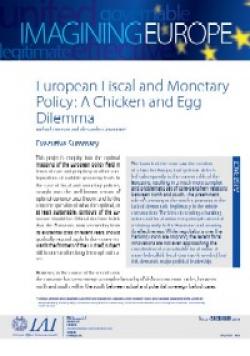European Fiscal and Monetary Policy: A Chicken and Egg Dilemma
The launch of the euro saw the creation of a two-tier Europe, but systemic defects led subsequently to the current crisis of the Eurozone, resulting in a much more complex and problematic set of core-periphery relations between north and south. The preeminent role of Germany in the north is pointing to the lack of democratic legitimacy in the whole construction. The idea of creating a banking union and fiscal union is in principle aimed at restoring unity to the Eurozone and ensuring its effectiveness. While negotiations over the banking union are ongoing, the recent fiscal innovations are not even approaching the constitution of a sustainable fiscal union. A more federalistic fiscal structure is needed, but this demands major political leadership.
Paper produced within the framework of the project "Towards a More United and Effective Europe".
-
Details
Roma, Istituto Affari Internazionali, 2013, 42 p. -
In:
-
Issue
2
1. Introduction
2. Macroeconomic recession and divergence
3. Macroeconomic policy regime development during the crisis
4. Financial market supervision and banking union
5. Quid fiscal union?
6. Quid the European labour market?
7. The European Central Bank through the crisis and beyond
8. Conclusions
References
Topic
Tag
Related content
-
Publication30/12/2014
Imagining Europe
leggi tutto -
Ricerca27/06/2013
Towards a More United and Effective Europe: Beyond the 2014 European Parliament Elections
leggi tutto



